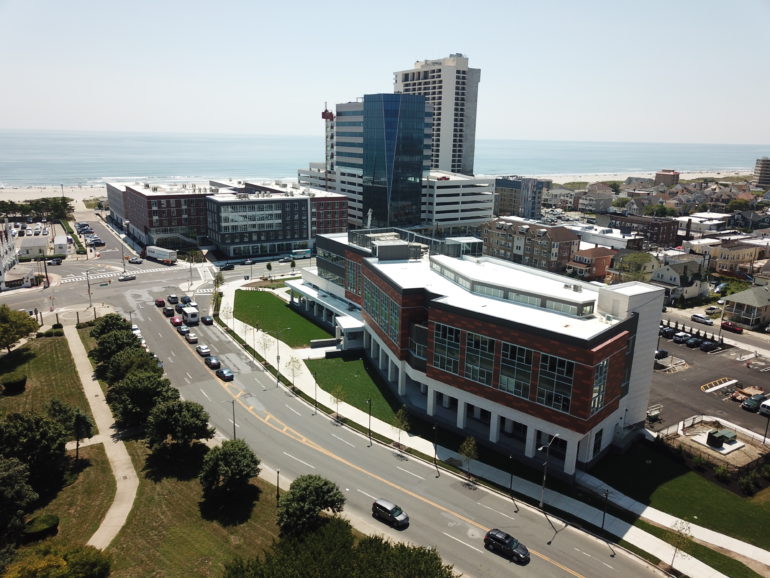An aerial view of the Atlantic City Gateway project, which includes the recently opened Stockton University campus and a new office tower for South Jersey Industries — Courtesy: Stockton
By Joshua Burd
Business leaders have secured nearly $700,000 in state funding for Atlantic City’s Chelsea neighborhood, supporting everything from streetscape improvements to outdoor fitness classes.
According to ACDEVCO, the developer of several recent high-profile projects in the area, the state has awarded $681,250 to the community through the New Jersey Neighborhood Revitalization Tax Credit Program. That has attracted organizations such as OceanFirst Bank, PNC Bank and Horizon Healthcare, which will receive a dollar-for-dollar tax credit to fund grants for projects in Chelsea.
New Jersey businesses have the opportunity to participate in the program in November of each year with a minimum contribution of $25,000.
“The Neighborhood Revitalization Tax Credit Program is one of the best public-private partnerships in the state because everyone wins,” said Lt. Gov. Sheila Oliver, who leads the state Department of Community Affairs. “Corporations that participate get a tax credit and contribute to neighborhood redevelopment programs of their choosing; nonprofit groups with a proven track record of helping their communities get much needed dollars; and residents get a better neighborhood.”
ACDEVCO, which spearheaded the new Stockton University campus and South Jersey Gas headquarters in Chelsea, led the effort to create a neighborhood plan and secure the award alongside the newly formed nonprofit Chelsea Economic Development Corp. The organizations held meetings and conducted surveys both in person and virtually, seeking to gain public input on the community’s priorities.
Ultimately, the plan identifies dozens of strategies focused in the areas of strengthening community, safety and wellness, youth and recreation, housing and economic development.
The tax credit program has funded nine projects in the initial round, ACDEVCO said, noting that organizations can apply every year for 10 years. The 2021 projects include:
- The Beautify Chelsea Street Captain program, which identifies and trains resident volunteers to lead beautification efforts with rewards such as sidewalk repairs, tree plantings, general clean up, lighting and other improvements requested by the residents. A paid coordinator and community steering committee will provide guidance and support to the volunteers.
- Home-buying grants and outreach for police officers and neighborhood renters
- Commercial real estate grants for neighborhood businesses to purchase their own building
- Beautification of vacant storefronts through art installations and storefront murals and other façade improvements
- Funding to the STEAM lab at the Boys & Girls Club in Chelsea, the STEM program at Our Lady Star of the Sea School and Mudgirl’s Studio job training program
- Support for Chelsea’s more than 100 small businesses through events, promotions, district branding and marketing, assistance applying for grants, access to capital, technical support and other resources
- Summer outdoor fitness classes that appeal to all ages, backgrounds and abilities
- Special events, including a fall market highlighting fresh produce, neighborhood restaurants and the neighborhood’s many cultures
- Social service outreach consisting of a comprehensive program of providing mental health professionals into the neighborhood; training residents to identify and provide assistance regarding social service issues; and accessing a network of providers and stakeholders to develop best practices
The project partners include AtlantiCare, the Greater Atlantic City Chamber of Commerce, the Atlantic City Arts Foundation, the Atlantic County Improvement Authority and the Latin American Economic Development Agency, according to a news release. The area for the tax credit plan totals less than a square mile from Annapolis to Texas avenues and from the beach to the bay, with a population of 10,000 residents and boundaries following low- and moderate-income census tracts 3, 4 and 5.
Several other Atlantic City neighborhoods are forming community development corporations, completing plans and pursuing NRTC funds, the news release said.










